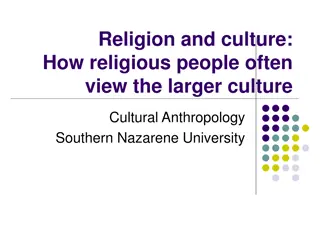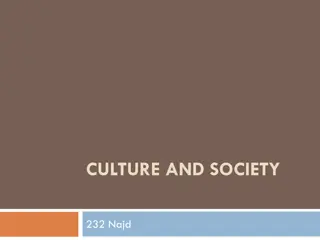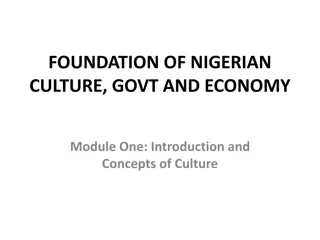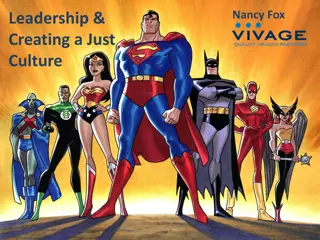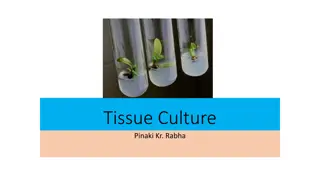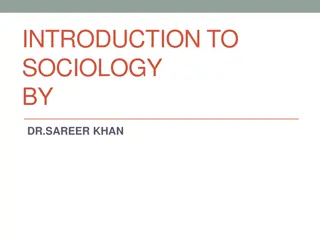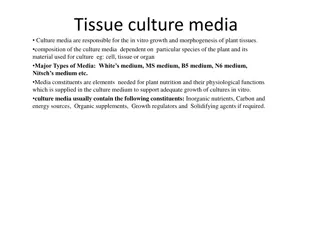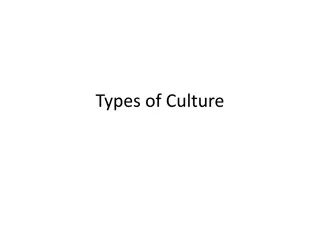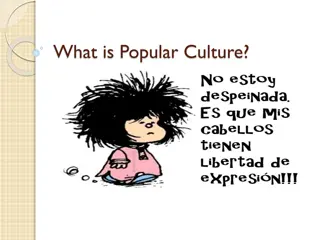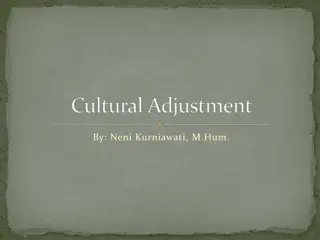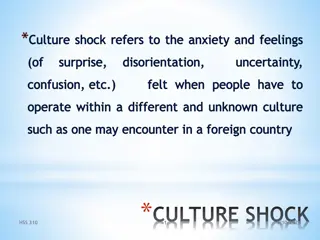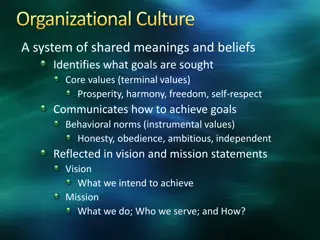The Main Characteristics of Culture
Culture is a complex social phenomenon that involves shared beliefs, values, norms, and traditions learned and transmitted among members of a society. It is a dynamic and accumulative process shaped through social interactions. Key characteristics include being learned, shared, social, transmitted, dynamic, and accumulative. Culture is not inherited biologically but acquired socially through experiences and interactions with others within a society.
Download Presentation

Please find below an Image/Link to download the presentation.
The content on the website is provided AS IS for your information and personal use only. It may not be sold, licensed, or shared on other websites without obtaining consent from the author.If you encounter any issues during the download, it is possible that the publisher has removed the file from their server.
You are allowed to download the files provided on this website for personal or commercial use, subject to the condition that they are used lawfully. All files are the property of their respective owners.
The content on the website is provided AS IS for your information and personal use only. It may not be sold, licensed, or shared on other websites without obtaining consent from the author.
E N D
Presentation Transcript
3.1 MAIN CHARACTERISTICS OF CULTURE 3.1 MAIN CHARACTERISTICS OF CULTURE
MAIN CHARACTERISTICS OF CULTURE MAIN CHARACTERISTICS OF CULTURE
CULTURE CULTURE HORTON AND HUNT DEFINITION Culture is everything which is socially shared and learned by the member of society.
According to TYLOR, It is the complex whole including beliefs, Arts, Region, Values, Norms, Ideas, Law, Knowledge, Custom and capabilities acquired by a man as a member of society.
MAIN CHARACTERISTICS OF CULTURE MAIN CHARACTERISTICS OF CULTURE Some of the important characteristics of culture are: Culture is learned Culture is shared Culture is social Culture is transmitted Culture is dynamic Culture is accumulative
CULTURE IS LEARNED CULTURE IS LEARNED Culture is a learned behavior.It is not inherited biologically but it is learnt socially by a man in a society through his senses and experiences. People can learn about their culture through interaction with parents, guardians and friends and social media.For example Dressing, Behaving, eating etc all are learnt by man.
CULTURE IS SHARED CULTURE IS SHARED Culture cannot exist without society. All members of a society living together will hold a shared set of values, ideas and Perception.They shared their culture with each other. For example, languages, customs, traditions, values, beliefs are all shared by man in a society.
CULTURE IS SOCIAL CULTURE IS SOCIAL Social Culture is not an individual phenomena but it is a group product of society. No man can acquire it without the association of others. It is developed through social interaction by many persons in a group of society. This include households, families associations, business interactions and power relations including politics.
CULTURE IS TRANSMITTED CULTURE IS TRANSMITTED Culture is capable of transmitted from one generation to the next. Parents transmit their cultural traits to their children and in return they pass to their children and so on. It is not transmitted through genes but through language. Language is means to communication which passes cultural traits from one generation to another.
CULTURE IS DYNAMIC CULTURE IS DYNAMIC No culture is ever in a permanent state it is dynamic. Culture is constantly changing because new ideas, techniques and knowledge are added and old ways are constantly modified and discarded.
CULTURE IS ACCUMULATIVE CULTURE IS ACCUMULATIVE Culture is the continuous process and adding up of new cultural traits. Many cultural traits are borrowed from out side and these are absorbed in that culture which adopt it, as culture is accumulative, it combines the suitable cultural traits.
REFRENCES REFRENCES http://www.studylecturenotes.com/social-sciences/sociology/112-what-is- culture-(retrieved on 12.10.19) https://slideplayer.com/slide/4375681/(retrieved on 12.10.19) https://www.slideshare.net/marssalmero/characteristics-of-culture- 15591237(retrieved on 13.10.19) https://www.slideshare.net/maryracedacayanan/characteristics-of-culture- 30287668?next_slideshow=1(retrieved on 13.10.19)





